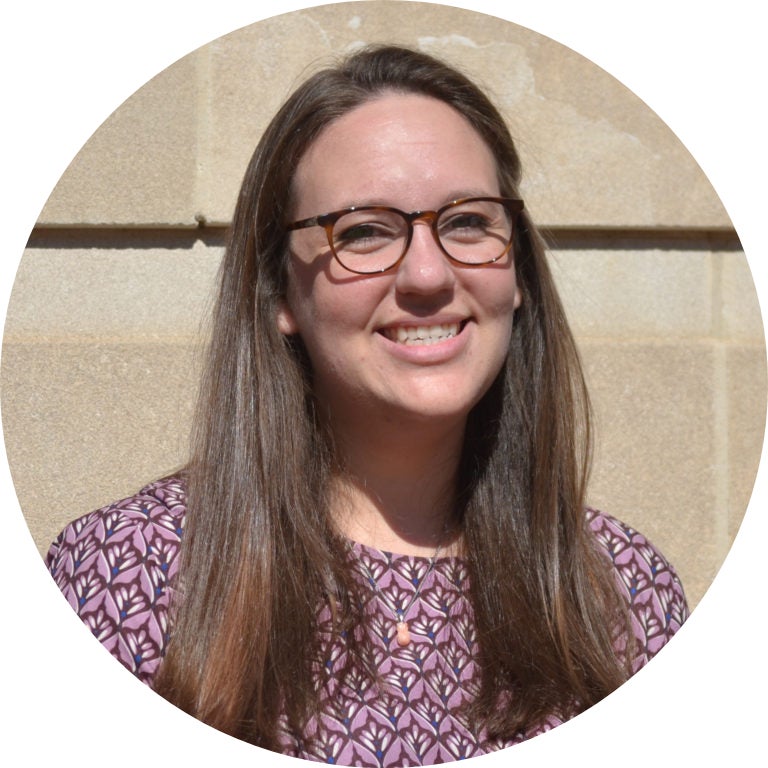
NCI F99/K00 Transition Award
“My research is focused on discovering second-line treatments for the deadly brain cancer, glioblastoma (GBM). Currently, I have two drug candidates that selectively kill drug resistant brain cancer cells, and a potential biomarker for their efficacy.”
About Deanna
Deanna Tiek is a 5th-year candidate in the Tumor Biology PhD program. She is originally from Bethalto, a very small town in southern Illinois. Deanna received my bachelor’s from Vanderbilt University, majoring in Cellular/Molecular Biology and Spanish, with a minor in Chemistry. During the summer, Deanna worked at Gold Bio Technologies in St. Louis to gain insight into the industry side of science.
What made you choose Georgetown University for your PhD?
During my interview I could tell right away that the Tumor Biology PhD program was like a family. Whether I was on a tour or having a meal with the current students, they all knew each other and were making plans for the weekends. Having worked under a PhD student in undergrad, I knew the stresses a PhD entailed and that I needed a collaborative and supportive environment. Georgetown did not disappoint. I have a great group of friends here who are very supportive and are always happy to discuss both science and life whenever necessary. (Many of which are also highlighted on this page!)
The faculty are also very supportive and interested in the students. I feel very comfortable popping into anyone’s office when I have data I don’t quite understand, or when my project drifts into their area of expertise. I’m always welcomed with open arms and insightful discussions.
What is your research focus and how did you become interested in it?
My research is focused on discovering second-line treatments for the deadly brain cancer, glioblastoma (GBM). GBM is a terrible disease with the shortest overall survival of any cancer, and that only has one main chemotherapeutic option – temozolomide/Temodar. As Temodar is a DNA-damaging agent, I’ve decided to look at changes in DNA and subsequent RNA structure and processing to potentially predict the damages caused by Temodar and determine second-line treatments once patients have become drug resistant. Currently, I have two drug candidates that selectively kill drug resistant brain cancer cells, and a potential biomarker for their efficacy.
During my time at Vandy, I thought I wanted to be pre-med and shadowed different doctors to determine what specialty I should choose. I remember going on rounds with the doctors in the pediatric oncology wing and being able to diagnose all of these children with terrible cancers, but either didn’t have an adequate treatment or had a treatment that might work with terrible side effects. I knew then that I couldn’t be an MD; I needed to have a molecular understanding so I might be able to determine dependencies of the disease to target and kill cancerous cells. I decided on brain cancer for personal reasons. I’ve had both family members and friends who have suffered from brain cancers. If I can prevent even one family from having to bury their loved one, it would all be worth it.
What is the name of the award you received, and can you briefly describe it?
NCI F99/K00 Transition Award. This is kind of a two-for-one deal. It funds up to two years of my current research at Georgetown, and then four years of research during my next career phase at a new institution.
What do these awards mean to you?
Honestly, it was a huge shock and really validating. F99/K00s are unique in that only one candidate is able to write the (~80+ page!) grant. It was already an honor to be picked as the candidate from Georgetown, but to be ranked in the first-tier of funding slots was astounding. Imposter syndrome is a huge issue in grad school as it’s common to never feel like you know enough or are smart enough to complete the program. To have my work be read by experts in the field who thought my research was worth doing was a huge confidence booster.
On a more pragmatic side, I have more choices for my post-doctoral institution as I come with my own salary. This relieves some of the pressure of finding a job post-graduation.
Do you have tips for other students interested in applying for this award or other external awards?
Apply. I feel like there are so many grants out there that we automatically count ourselves out of getting for no good reason. If you’re eligible, you should really try to apply for as many grants as possible. Personally, it helped me to really set my ideas down in a concrete manner. I struggle with getting my ideas across in a concise version, and having others critique my story was both humbling and informative. I’d also say it’s important to set a timeline for both yourself and your mentor for dates pieces have to be done. Everyone is busy, so giving collaborators and reference letter writers enough time is crucial as well.
If you could meet one scientist, who would you want to meet and why?
Well, I’ve technically already met him, but I’d love to have a conversation with Adrian Krainer. He won this year’s Breakthrough Prize in part for his drug Spinraza. I saw him present for the first time last year at my first RNA conference. I was just getting into the field, and his story on Spinraza showed that if you could truly understand a disease (SMA for him), you could make a smarter drug to treat it. His success really gives me hope for the future.
